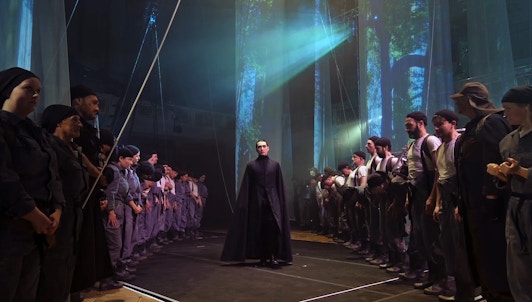After no less than nine years of work, three revamps, an abundance of librettists and a multitude of touch ups, Beethoven finally presented the definitive version of his only opera: Fidelio. A strong admirer of the enlightenment movement, the composer explores this idea through the triumph of love against political oppression. Fluctuating between spoken dialogues and sung melodies the opera follows the structure of a Singspiel - an operatic style very similar to the french tradition of opéra-comique. Here, the Accentus ensemble and Insula Orchestra provide us with a more modern and dramatic performance under the musical and stage direction of Laurence Equilbey and David Bobée.
Inspired by the theater piece Léonore ou l’amour conjugal, the librettist Joseph Sonnleithner creates his version of the prisoner, Florestan, captured during the 12th century in Spain by his arch-nemesis, Don Pizarro. Seeking to liberate her husband, Léonore breaks into the prison in the guise of a man called Fidelio. The opera opens with Fidelio plotting his next move having gained the trust of the jailor, Rocco. The protagonist learns that Don Pizarro plans on killing Florestan. It’s only in the second act that we discover Florestan locked in his prison alone, crying for his wife and preparing for death. Just before delivering the final blow to Florestan, Pizarro is stabbed by the courageous Léonore. The opera closes with the arrival of Don Fernando who finally puts an end to Pizarro’s wiles and liberates both Florestan and Léonore, marking the triumph of love over political oppression.
In a minimalist and contemporary staging, highlighting the dark and oppressive atmosphere, the evening’s singers, Stanislas de Barbeyrac (Florestan), Sinead Campbell-Wallace (Léonore), Christian Immler (Rocco) and Sebastian Holececk (Don Pizarro) shine brightly.
